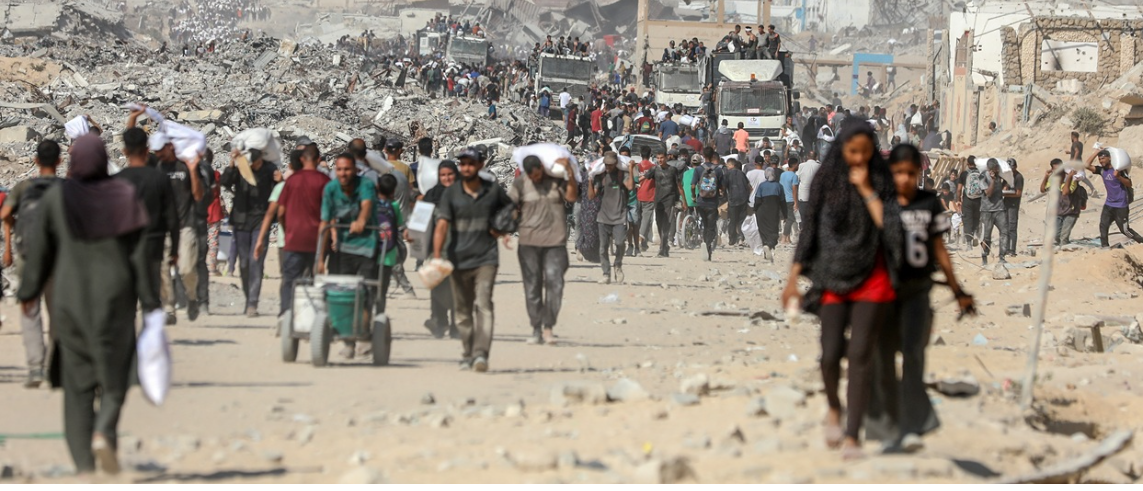Terrorism- Courage, Not Extremism, Must Define the Middle East’s Future

Peace will not be handed to us by extremists or slogans. It will be built by courage—the courage to confront terror and to replace despair with dignity.
The recent emergency summit in Doha, bringing together Arab and Muslim leaders, revealed both the promise of regional leadership and the contradictions that threaten it. I have no problem with the gathering itself, nor with speeches condemning Israel’s strike on Doha, which targeted Hamas operatives hiding on Qatari soil. But what left me speechless was the sight of the Iranian president arriving in Doha—the same leader whose regime had violated Qatar’s sovereignty just months ago—now speaking of “national sovereignty” and “solidarity against the aggressor.”

What peace is he talking about? The peace financed by Iran when it arms Hamas, which on October 7 murdered innocents in their homes, kidnapped children, and brutalized women? The peace imposed by Hezbollah, a fascist movement holding Lebanon hostage? The peace of the Houthis, who devastate their own people? Or the peace of the Revolutionary Guard, which jails and executes anyone who resists the mullahs’ rule?
Qatar does not need this kind of partnership. With its global investments, its skyscrapers rising over Doha, and its role in high-tech ventures in the West, Qatar has already demonstrated what forward-looking leadership can be. It has the capacity to serve as a positive influence, one that looks to the future of its own people and to new generations across the region.
That potential is not theoretical. Qatar’s leaders played a vital role in negotiating the release of hostages held by Hamas. They proved they can shape outcomes when they choose to act. My hope is that this influence will now extend beyond the battlefield of hostages—to freeing minds and communities from the grip of extremism, from the dead end of radical ideologies, and onto the path of modernity, development, and prosperity.
Qatar’s leaders are capable of this, and history would remember them for choosing the path of reason and light.
And this is where a broader truth must be faced. Because, for more than a century, cowardice and hypocrisy have paved the road to today’s tragedy. Western powers looked away at crucial moments when they could have enforced solutions. Arab states too often treated the Palestinian cause as a political tool. Palestinian leaders, mired in division and corruption, betrayed their people. And Israel, facing decades of terror and hostility, hardened into a defensive crouch, with parts of its politics drifting to extremes.
The outcome is before us: Hamas dragging Palestinians into extremism; Israel feeling besieged by Iranian designs and Islamist ideology; a region trapped in cycles of vengeance.
Yet let us not forget something important: before October 7, the Middle East was tasting a moment of hope. The Abraham Accords—designed and championed by Jared Kushner under President Donald Trump’s leadership—opened doors thought forever locked. The idea was simple yet transformative: peace built on prosperity, giving people dignity through work and opportunity. For a brief period, Arabs and Israelis imagined a different future—and they were right to do so. That vision succeeded because leaders had the courage to back it. But the forces of terror could not allow it to last. They struck not only to kill innocents but to murder hope itself.
The easy path now is resignation—to sigh and declare this is how the Middle East will always be. But resignation is moral failure. Do we allow Hamas to dictate the destiny of Palestinians and Israelis alike? Do we give extremists veto power over our children’s future?
No. We must confront extremism with clarity and resolve. The United States remains the only actor capable of imposing limits on the forces of destruction. Washington must wield not only diplomacy, but also the full weight of its legal and financial power: sever the funding pipelines that nourish hatred; silence the propaganda machines of the Muslim Brotherhood and other extremist networks that indoctrinate the young; strip away the impunity of families and enablers of terrorism. Unless the infrastructure of terror is dismantled, the cycle will regenerate under new names and faces.
But confrontation alone is not enough. The other half of this battle is hope. The Palestinian people deserve dignity. Not slogans or paper promises, but real dignity: schools, hospitals, safety, and the chance for a better future. A young Palestinian should be offered opportunity, not despair. To deny them this is to guarantee perpetual conflict.
Israel, too, deserves more than survival. It deserves security without perpetual fear; a future where children live without bomb shelters defining their lives. Israelis have the right to defend themselves against terror, but they also long for the normalcy of peace.
The choice before us is stark but not hopeless. We can recycle old formulas, repeating condemnations while extremists regroup. Or we can summon courage: to punish terror ruthlessly, to end the hypocrisy of regional actors, and to invest in dignity for ordinary people on both sides.
The hostages must be freed. The innocent must be protected. And the region must turn away from slogans of destruction toward a future of life.
Peace will not be handed to us by extremists or slogans. It will be built by courage—the courage to confront terror, to replace despair with dignity, and to finally imagine a Middle East where peace is not a dream, but a reality.
- Questions and Answers
- Opinion
- Motivational and Inspiring Story
- Technology
- Live and Let live
- Focus
- Geopolitics
- Military-Arms/Equipment
- Безопасность
- Economy
- Beasts of Nations
- Machine Tools-The “Mother Industry”
- Art
- Causes
- Crafts
- Dance
- Drinks
- Film/Movie
- Fitness
- Food
- Игры
- Gardening
- Health
- Главная
- Literature
- Music
- Networking
- Другое
- Party
- Religion
- Shopping
- Sports
- Theater
- Health and Wellness
- News
- Culture

